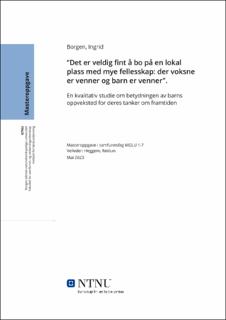| dc.contributor.advisor | Heggem, Reidun. | |
| dc.contributor.author | Borgen, Ingrid. | |
| dc.date.accessioned | 2023-07-26T17:20:12Z | |
| dc.date.available | 2023-07-26T17:20:12Z | |
| dc.date.issued | 2023 | |
| dc.identifier | no.ntnu:inspera:147067678:45038039 | |
| dc.identifier.uri | https://hdl.handle.net/11250/3081529 | |
| dc.description.abstract | Stedet vi kommer fra er med på å forme oss og legger grunnlag for hvilke valg vi tar senere i livet. Vi vet at den urbane livsstilen står sterkt i samfunnet og det er i dag mange unge som tar valget med å flytte ut fra bygda og inn til byene når de blir eldre. Formålet med denne studien var derfor å se om denne “urbane ethosen” allerede er forankret hos barn, og hvilken betydning nåværende bosted har å si for hvordan de ser for seg fremtiden sin. Valg og utforming av oppgaven er tatt på bakgrunn av denne problemstillingen: "Hvilke tanker har mellomtrinnselever fra ulik geografisk plassering rundt nåværende hjemsted og framtidig hjemsted? Hvilken betydning har oppvekststed for elevenes framtidsplaner?”
Oppgaven har en deduktiv tilnærming og kvalitativ retning, hvor datainnsamlingene ble gjennomført via innsamling av elevtekster. Studien tok for seg tre skoler med ulik geografisk plassering i Midt-Norge, hvor to skoler kan karakteriseres som rurale, og den siste som urban. Elevene som var med i undersøkelsene er mellom 10-12 år. Det ble samlet inn i alt 87 tekster. Funnene er blitt drøftet i lys av teorier som omhandler identitet, migrasjon/immobilitet og ulike forståelser av ruralitet og urbanitet.
Hovedfunnene i forskningen viser at bygdebarn er svært tilfreds med stedet de bor på nå, og hvor stedstilknytningen la føringer for hvordan de så for seg livet i fremtiden. De fleste virket å identifisere seg med stedet, og kunne gjerne tenke seg å bo der videre når de ble eldre. Bybarna viser seg å være mer løsrevne fra plassen de har vokst opp på og har i større grad et ambivalent forhold til nåværende bosted. Gjennom svarene virker det som de tørr å drømme større, hvor flere ønsker en fremtid utenfor landegrensen.
Nøkkelord: Migrasjon, Identitet, tilknytning, stayers, plassmyter, rural idyll, rural dull. | |
| dc.description.abstract | The place we come from helps shape us and lay the foundation for the choices we make later in life. We know that urban lifestyles are popular in society and today many young people choose to move from rural areas to cities as they get older. The purpose of this study was therefore to see if this “urban ethos” already is rooted in children, and what significance their current place of residence has for how they envision their future. The choice and design of the task are based on the following research question: “What are the thoughts of middle school students from different geographic locations around their current and future place of residence? What significance does the place of upbringing have on the students future plans”?
My task has a deductive approach and a qualitative direction, where data collection was carried out through the collection of student texts. The research focused on three schools with different geographic locations in Central Norway, where two schools can be characterized as rural and the third as urban. The students who participated in the study were between 10-12 years old. A total of 87 texts were collected. The findings have been discussed in light of theories that deal with identity, migration/immobility, and different understandings of rurality and urbanity.
The main findings of the research show that rural children are very satisfied with their current place of residence, and that their attachment to the place influenced how they envisioned their lives in the future. Most seemed to identify with the place and would like to continue living there when they grew older. Urban children appear to be more disconnected from the place they grew up in and have a more ambivalent relationship with their current place of residence. Through their responses, it seemed like they dared to dream bigger, with several wishing for a future outside Norway.
Keywords: Migration, identity, attachment, stayers, placemyth, rural idyll, rural dull. | |
| dc.language | nob | |
| dc.publisher | NTNU | |
| dc.title | “Det er veldig fint å bo på en lokal plass med mye fellesskap: der voksne er venner og barn er venner”.
En kvalitativ studie om betydningen av barns oppveksted for deres tanker om framtiden | |
| dc.type | Master thesis | |
